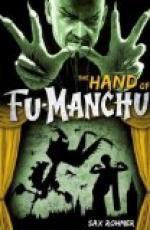“He has lost the power of speech!” whispered Smith.
“He was stricken dumb, gentlemen, ten minutes ago,” said Beeton in a trembling voice. “He dropped off to sleep out there on the floor, and I brought him in here and laid him on the bed. When he woke up he was like that!”
The man on the bed ceased his inchoate babbling and now, gulping noisily, began to make quick nervous movements with his hands.
“He wants to write something,” said Smith in a low voice. “Quick! hold him up!” He thrust his notebook, open at a blank page, before the man whose movement were numbered, and placed a pencil in the shaking right hand.
Faintly and unevenly Sir Gregory commenced to write—whilst I supported him. Across the bent shoulders Smith silently questioned me, and my reply was a negative shake of the head.
The lamp above the bed was swaying as if in a heavy draught; I remembered that it had been swaying as we entered. There was no fog in the room, but already from the bleak corridor outside it was entering; murky, yellow clouds steaming in at the open door. Save for the gulping of the dying man, and the sobbing breaths of Beeton, there was no sound. Six irregular lines Sir Gregory Hale scrawled upon the page; then suddenly his body became a dead weight in my arms. Gently I laid him back upon the pillows, gently his finger from the notebook, and, my head almost touching Smith’s as we both craned forward over the page, read, with great difficulty, the following:—
“Guard my diary.... Tibetan
frontier ... Key of India. Beware man ...
with the limp. Yellow ... rising.
Watch Tibet ... the Si-Fan....”
From somewhere outside the room, whether above or below I could not be sure, came a faint, dragging sound, accompanied by a tap—tap—tap....
CHAPTER III
“Sakya Muni”
The faint disturbance faded into silence again. Across the dead man’s body I met Smith’s gaze. Faint wreaths of fog floated in from the outer room. Beeton clutched the foot of the bed, and the structure shook in sympathy with his wild trembling. That was the only sound now; there was absolutely nothing physical so far as my memory serves to signalize the coming of the brown man.
Yet, stealthy as his approach had been, something must have warned us. For suddenly, with one accord, we three turned upon the bed, and stared out into the room from which the fog wreaths floated in.
Beeton stood nearest to the door, but, although he turned, he did not go out, but with a smothered cry crouched back against the bed. Smith it was who moved first, then I followed, and close upon his heels burst into the disordered sitting-room. The outer door had been closed but not bolted, and what with the tinted light, diffused through the silken Japanese shade, and the presence of fog in the room, I was almost tempted to believe myself the victim of a delusion. What I saw or thought I saw was this:—




